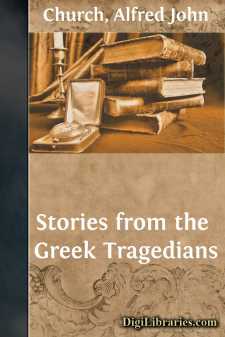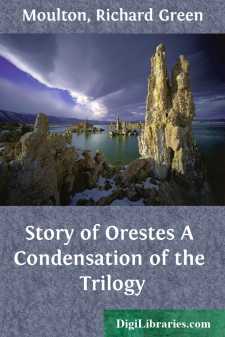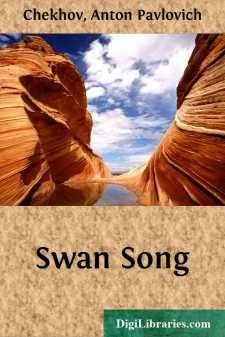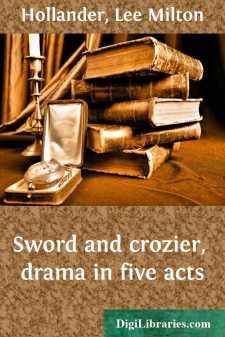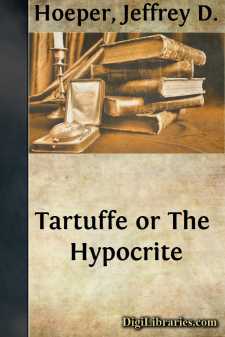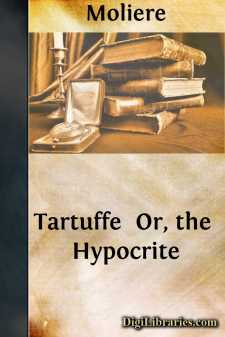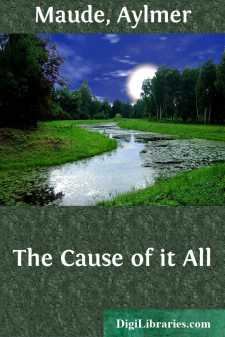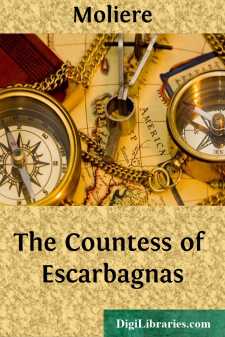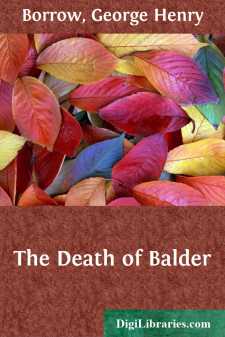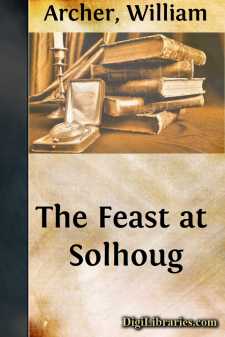Drama
- American 43
- Ancient, Classical & Medieval 45
- Asian 7
- Caribbean & Latin American 2
- Continental European
- English, Irish, Scottish, Welsh 91
- General 105
- Middle Eastern 1
- Religious & Liturgical 1
- Shakespeare 1
Continental European Books
Sort by:
The Story Of The Love Of Alcestis. Asclepius, the son of Apollo, being a mighty physician, raised men from the dead. But Zeus was wroth that a man should have such power, and so make of no effect the ordinance of the Gods. Wherefore he smote Asclepius with a thunderbolt and slew him. And when Apollo knew this, he slew the Cyclopés that had made the thunderbolts for his father Zeus, for men say that...
more...
MEMORANDUM The Sacred Legends touched by this Trilogy would be familiar, in outline, to the Auditors: e. g.: The woes of the House of Atreus: the foundation of them laid by Atreus when, to take vengeance on his brother Thyestes, he served up to him at a banquet the flesh of his own sons; His grandsons were Agamemnon and Menelaus: Menelaus' wife, Helen, was stolen by a guest, Paris of Troy, which...
more...
INTRODUCTION ANTON TCHEKOFF THE last years of the nineteenth century were for Russia tinged with doubt and gloom. The high-tide of vitality that had risen during the Turkish war ebbed in the early eighties, leaving behind it a dead level of apathy which lasted until life was again quickened by the high interests of the Revolution. During these grey years the lonely country and stagnant provincial towns...
more...
ACT I SCENE I (So-called 'Little Hall' in BRAND'S manor-house at Reynistad. Enter the DEACON SIGURD, THOROLF BJARNASON, ALF OF GROF, and EINAR THE RICH, of Vik.) Deacon Sigurd.—Thorolf, Lady Jorun bade you wait here until her husband comes. Thorolf.—Where is Brand Kolbeinsson? I bear a message for him from my Lord Kolbein the Young. Sigurd.—Why comes he not himself? Alf.—Kolbein...
more...
ACT ISCENE I Madame Pernelle and her servant Flipote, Elmire, Mariane, Dorine, Damis, Cleante Mme. Pernelle. Let's go, Flipote, let's go. I hate this place. Elmire. I can't keep up, you rush at such a pace. Mme. Pernelle. Peace, my dear, peace; come no farther.I don't wish to cause you any bother. Elmire. What duty demands, I insist on giving.But, mother, what has caused...
more...
by:
Moliere
ACT I SCENE I MADAME PERNELLE and FLIPOTTE, her servant; ELMIRE, MARIANE, CLEANTE, DAMIS, DORINE MADAME PERNELLE Come, come, Flipotte, and let me get away. ELMIRE You hurry so, I hardly can attend you. MADAME PERNELLE Then don't, my daughter-in law. Stay where you are. I can dispense with your polite attentions. ELMIRE We're only paying what is due you,...
more...
by:
Aylmer Maude
ACT I Autumn. A peasant's hut, with a small room partitioned off. AkulÃna sits spinning; Martha the housewife is kneading bread; little Paráshka is rocking a cradle. MARTHA. Oh dear, my heart feels heavy! I know it means trouble; there's nothing to keep him there. It will again be like the other day, when he went to town to sell the firewood and drank nearly half of it. And he blames me...
more...
by:
Moliere
SCENE I.—JULIA, THE VISCOUNT. Visc. What! you are here already? Ju. Yes, and you ought to be ashamed of yourself, Cléante; it is not right for a lover to be the last to come to the rendezvous. Visc. I should have been here long ago if there were no importunate people in the world. I was stopped on my way by an old bore of rank, who asked me news of the court, merely to be able himself to detail to...
more...
ACT THE FIRST. BALDER and THOR are seated upon stones at some distance from each other. Both are armed—THOR with his hammer, and BALDER with spear and sword. BALDER. Land whose proud and rocky bosomBraves the sky continually! THOR. Where should strength and valour blossom,Land of rocks, if not in thee? BALDER. Odin’s shafts of ruddy levinBack from thy hard sides are driven;Never sun thy...
more...
by:
William Archer
INTRODUCTION* Exactly a year after the production of Lady Inger of Ostrat—that is to say on the "Foundation Day" of the Bergen Theatre, January 2, 1866—The Feast at Solhoug was produced. The poet himself has written its history in full in the Preface to the second edition. The only comment that need be made upon his rejoinder to his critics has been made, with perfect fairness as it seems...
more...


